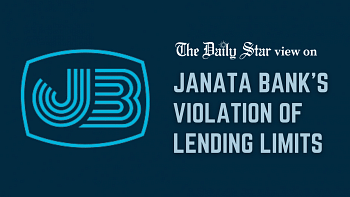When will Janata Bank’s troubles end?

It seems the state-owned Janata Bank PLC is stuck in a quagmire of bad performance and questionable banking practices. A compliance report prepared by the Bangladesh Bank's off-site supervision department on four state-owned commercial banks—Janata, Sonali, Rupali and Agrani—found that, during the period of January-June 2023, Janata Bank underperformed on all the metrics set to evaluate performance improvement. Given the fact that Janata has the second largest volume of deposits and loans in the country, we are alarmed by this state of affairs.
Our central bank has been setting a number of biannual performance improvement targets since 2007 to evaluate the banks' performances, with a greater aim of improving their financial health. These targets include recovering cash from loan defaulters, bringing down defaulted loan ratio, improving capital base, improving credit growth, boosting profitability, etc. Let's take improving large loan portfolios for example. The banking regulator set ceilings for large loan portfolios of these four banks based on their respective defaulted loan ratios. According to the BB report, Janata crossed the limit by a large margin during the January-June period: as of June 30, as much as 64 percent of the bank's total loan portfolio was large loans, while the ceiling was set at 30 percent. In comparison, Agrani Bank's large loan portfolio was 34 percent against its ceiling of 30 percent, Sonali Bank's was 48 percent against a 38 percent limit, and Rupali Bank managed to keep its large loan portfolio under its 34 percent limit.
Not only that, while the central bank asked these state-owned banks to reduce credit concentration in their respective top five branches, Janata's credit concentration in its top five branches increased instead. In cash recovery from defaulted loans and reduction of classified loans, too, Janata fared the worst among the four banks. We cannot help but wonder: why this consistent bad performance?
In these circumstances, the Janata Bank management has made some moves that seems suicidal. For example, one of its top large borrowers, AnonTex Group, which boasts an annual turnover of $150 million, has failed to pay off a staggering Tk 7,726 crore of loans (as of December 2022) to the bank, yet the bank has been overtly lenient to the RMG manufacturer for more than a decade, not classifying its loans as per banking regulations. Why be so accommodating to a known loan defaulter, especially when the bank is suffering with low profits and liquidity crisis?
That our banking sector is rife with financial irregularities is not news. And our state-owned banks have historically exhibited lenience to big lending irregularities often caused by undesirable influences. But when the country is going through an unprecedented financial crisis, we expect the relevant actors to step up and act accordingly to stop our banks from haemorrhaging money. Sadly, both the Janata Bank management and Bangladesh Bank, not to mention the higher financial authorities, have failed on this front. We can only hope that the bank management will take the BB compliance report with due caution and do what's needed to improve its performance.
Follow The Daily Star Opinion on Facebook for the latest opinions, commentaries and analyses by experts and professionals. To contribute your article or letter to The Daily Star Opinion, see our guidelines for submission.


 For all latest news, follow The Daily Star's Google News channel.
For all latest news, follow The Daily Star's Google News channel. 









Comments